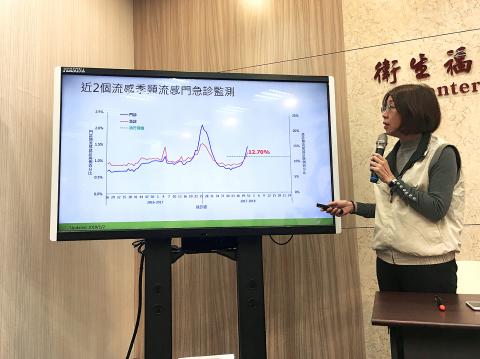The virus targeted by the flu vaccines supplied for this season do not match the dominant virus that is circulating, reducing their efficacy, the Centers for Disease Control (CDC) said yesterday.
According to the CDC’s weekly data, 97,003 cases of flu-like illnesses were reported last week, an increase of 24 percent from the week before, indicating that the nation is experiencing the peak of this flu season.
CDC Epidemic Intelligence Center Director Liu Ting-ping (劉定萍) said that 22 people were confirmed to have serious flu complications, 18 of whom did not receive vaccinations.

Photo: CNA
“The dominant circulating virus is the influenza B virus,” she said, adding that 21 clustered cases were reported in the past four weeks, 16 of which (76 percent) were on school campuses.
The dominant circulating virus is of the Yamagata lineage, but the WHO-recommended composition of trivalent vaccines for use in the northern hemisphere’s flu season was two influenza A viruses (H1N1 and H3N2) and an influenza B virus of the Victoria lineage, CDC Deputy Director-General Chuang Jen-hsiang (莊人祥) said.
“The effectiveness of the vaccine can reach 60 to 70 percent if the predicted influenza B lineage matches the dominant circulating virus,” he said.
“Although the virus was predicted incorrectly, the vaccine can still offer cross-protection against the Yamagata lineage and has a protective efficacy of about 30 to 50 percent, which still reduces the risk of serious complications and death,” Chuang added.
Getting vaccinated still provides protection against infection and maintaining good personal hygiene by washing hands frequently, wearing a mask in crowded places and seeing a doctor when symptoms arise can also enhance protection, he said.
The CDC said the latest WHO report showed that the dominant circulating viruses are influenza A subtype H3N2 in the US and Canada, influenza A subtype H1N1 in Japan and influenza B in Taiwan, Hong Kong, South Korea, China and Europe, adding that people who are planning to travel overseas should take proper pre-emptive measures.

Taiwan is projected to lose a working-age population of about 6.67 million people in two waves of retirement in the coming years, as the nation confronts accelerating demographic decline and a shortage of younger workers to take their place, the Ministry of the Interior said. Taiwan experienced its largest baby boom between 1958 and 1966, when the population grew by 3.78 million, followed by a second surge of 2.89 million between 1976 and 1982, ministry data showed. In 2023, the first of those baby boom generations — those born in the late 1950s and early 1960s — began to enter retirement, triggering

ECONOMIC BOOST: Should the more than 23 million people eligible for the NT$10,000 handouts spend them the same way as in 2023, GDP could rise 0.5 percent, an official said Universal cash handouts of NT$10,000 (US$330) are to be disbursed late next month at the earliest — including to permanent residents and foreign residents married to Taiwanese — pending legislative approval, the Ministry of Finance said yesterday. The Executive Yuan yesterday approved the Special Act for Strengthening Economic, Social and National Security Resilience in Response to International Circumstances (因應國際情勢強化經濟社會及民生國安韌性特別條例). The NT$550 billion special budget includes NT$236 billion for the cash handouts, plus an additional NT$20 billion set aside as reserve funds, expected to be used to support industries. Handouts might begin one month after the bill is promulgated and would be completed within

The National Development Council (NDC) yesterday unveiled details of new regulations that ease restrictions on foreigners working or living in Taiwan, as part of a bid to attract skilled workers from abroad. The regulations, which could go into effect in the first quarter of next year, stem from amendments to the Act for the Recruitment and Employment of Foreign Professionals (外國專業人才延攬及僱用法) passed by lawmakers on Aug. 29. Students categorized as “overseas compatriots” would be allowed to stay and work in Taiwan in the two years after their graduation without obtaining additional permits, doing away with the evaluation process that is currently required,

IMPORTANT BACKER: China seeks to expel US influence from the Indo-Pacific region and supplant Washington as the global leader, MAC Minister Chiu Chui-cheng said China is preparing for war to seize Taiwan, Mainland Affairs Council (MAC) Minister Chiu Chui-cheng (邱垂正) said in Washington on Friday, warning that Taiwan’s fall would trigger a regional “domino effect” endangering US security. In a speech titled “Maintaining the Peaceful and Stable Status Quo Across the Taiwan Strait is in Line with the Shared Interests of Taiwan and the United States,” Chiu said Taiwan’s strategic importance is “closely tied” to US interests. Geopolitically, Taiwan sits in a “core position” in the first island chain — an arc stretching from Japan, through Taiwan and the Philippines, to Borneo, which is shared by